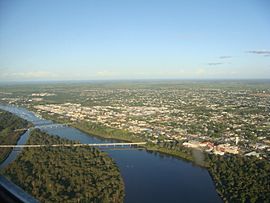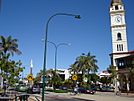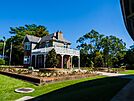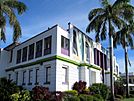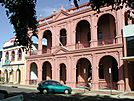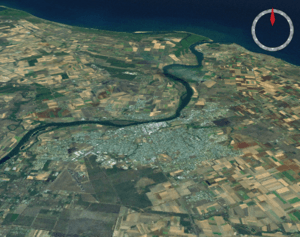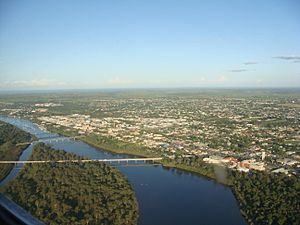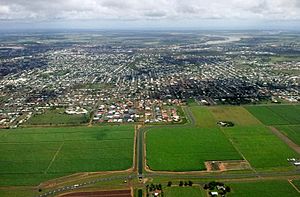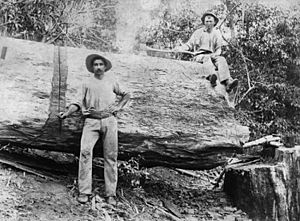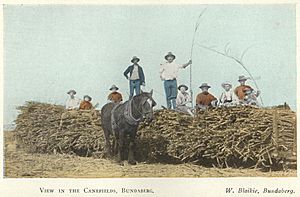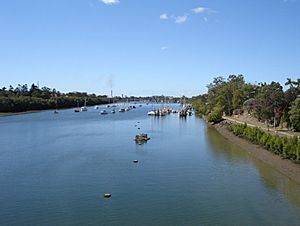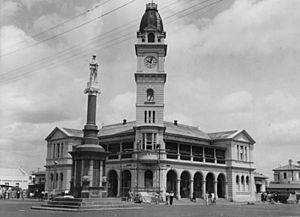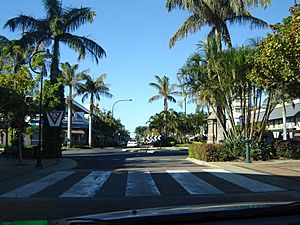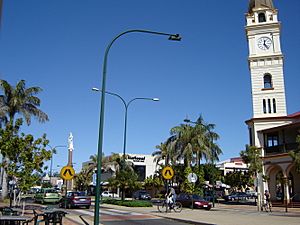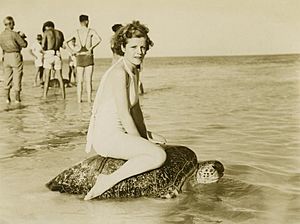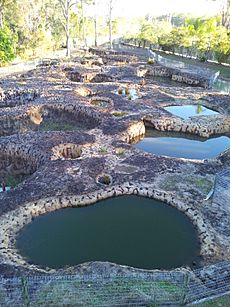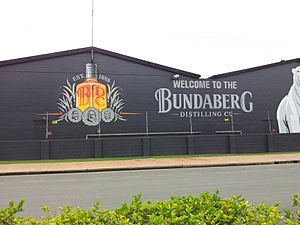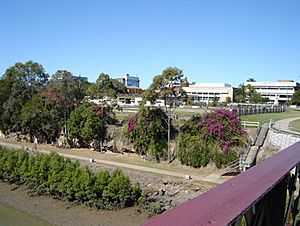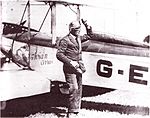Bundaberg facts for kids
Quick facts for kids BundabergQueensland |
|||||||||
|---|---|---|---|---|---|---|---|---|---|
|
(From left to right)
Aerial view of Bundaberg and the Burnett River, Bundaberg Post Office and Bundaberg War Memorial, Hinkler House in the Bundaberg Botanic Gardens, Bundaberg Regional Art Gallery, Historic architecture along Bourbong street, Bundaberg Rum Distillery, South Sea Islander wall |
|||||||||
| Population | 73,747 (Significant Urban Area) (2021 census) (25th) | ||||||||
| Established | 1870 | ||||||||
| Postcode(s) | 4670 | ||||||||
| Elevation | 15 m (49 ft) | ||||||||
| Time zone | AEST (UTC+10:00) | ||||||||
| Location |
|
||||||||
| LGA(s) | Bundaberg Region | ||||||||
| County | Cook | ||||||||
| State electorate(s) |
|
||||||||
| Federal Division(s) | Hinkler | ||||||||
|
|||||||||
Bundaberg is a city in Queensland, Australia. It's the tenth largest city in the state. Bundaberg is often called "Bundy," "Rum City," or "The 'Berg."
The city is located along the Burnett River. This river flows into the Coral Sea. Bundaberg is built on a rich coastal plain. This area is great for farming. Many different Aboriginal peoples, like the Taribelang-Bunda, Goreng Goreng, Gurang, and Bailai, have lived in the Bundaberg area for a long time.
Bundaberg was designed in 1868 with wide streets. Large sugar cane farms started in the 1880s. This led to sugar mills and rum factories. These industries helped Bundaberg grow. Sadly, many South Sea Islanders were brought to work on these farms. They were forced to work and treated unfairly. This practice was stopped in 1904.
Major floods in 1942 and 1954 changed the river. This meant Bundaberg could no longer be a river port. A new port was built at the mouth of the Burnett River. In 2013, Bundaberg had its worst flood ever because of Cyclone Oswald.
Today, Bundaberg's economy relies on farming, fishing, and tourism. It also has big rum and drink factories. These products are sold all over the world. The city has a port and an airport.
Bundaberg has a rich history and culture. It's known for its weeping fig trees and old plantations. Some plantations, like Fairymead, have important history. The city also has places important to South Sea Islander culture. These include Sir Anthony's Rest and the South Sea Islander Church. You can visit the Hinkler Hall of Aviation and the Bundaberg Regional Art Gallery.
Bundaberg is a popular place for tourists. You can visit nearby towns like Childers and Gin Gin. There are also natural spots like Cania Gorge National Park. The coast has beaches like Bargara and Mon Repos. You can even visit the southern part of the Great Barrier Reef from here.
Contents
- Exploring Bundaberg's Geography
- What Does the Name Bundaberg Mean?
- Bundaberg's History
- Bundaberg's Population
- Historic Places in Bundaberg
- Bundaberg's Economy
- Fun Things to Do in Bundaberg
- Arts, Entertainment, and Media
- Sports in Bundaberg
- Community Groups
- Education in Bundaberg
- Getting Around Bundaberg
- Military Presence
- Sister Cities
- Famous People from Bundaberg
- Images for kids
- See also
Exploring Bundaberg's Geography
What is Bundaberg's Climate Like?
Bundaberg has a subtropical climate. This means it has hot, wet summers and mild winters. The weather here is considered one of the most pleasant in Australia.
The hottest month is January, with an average high of 30.3 degrees Celsius. The coolest month is July, with an average low of 9.9 degrees Celsius. Sometimes, inland areas can even have light frosts. The city gets about 1142.6 millimeters of rain each year.
| Climate data for Bundaberg Post Office | |||||||||||||
|---|---|---|---|---|---|---|---|---|---|---|---|---|---|
| Month | Jan | Feb | Mar | Apr | May | Jun | Jul | Aug | Sep | Oct | Nov | Dec | Year |
| Record high °C (°F) | 38.9 (102.0) |
38.3 (100.9) |
37.7 (99.9) |
34.9 (94.8) |
31.7 (89.1) |
29.7 (85.5) |
28.8 (83.8) |
30.7 (87.3) |
36.5 (97.7) |
35.8 (96.4) |
37.7 (99.9) |
40.2 (104.4) |
40.2 (104.4) |
| Mean daily maximum °C (°F) | 30.3 (86.5) |
30.0 (86.0) |
29.3 (84.7) |
27.5 (81.5) |
24.8 (76.6) |
22.4 (72.3) |
22.0 (71.6) |
23.2 (73.8) |
25.2 (77.4) |
27.1 (80.8) |
28.7 (83.7) |
30.1 (86.2) |
26.7 (80.1) |
| Mean daily minimum °C (°F) | 21.3 (70.3) |
21.2 (70.2) |
20.0 (68.0) |
17.4 (63.3) |
13.9 (57.0) |
11.3 (52.3) |
9.9 (49.8) |
10.7 (51.3) |
13.4 (56.1) |
16.5 (61.7) |
18.8 (65.8) |
20.6 (69.1) |
16.3 (61.3) |
| Record low °C (°F) | 14.1 (57.4) |
12.2 (54.0) |
9.7 (49.5) |
6.7 (44.1) |
3.3 (37.9) |
0.7 (33.3) |
−0.7 (30.7) |
−0.2 (31.6) |
0.2 (32.4) |
5.5 (41.9) |
7.9 (46.2) |
10.6 (51.1) |
−0.7 (30.7) |
| Average precipitation mm (inches) | 205.8 (8.10) |
173.5 (6.83) |
139.7 (5.50) |
84.1 (3.31) |
70.6 (2.78) |
65.7 (2.59) |
53.5 (2.11) |
33.4 (1.31) |
35.7 (1.41) |
62.8 (2.47) |
85.0 (3.35) |
131.0 (5.16) |
1,142.6 (44.98) |
| Average precipitation days | 10.0 | 9.6 | 9.5 | 6.6 | 5.7 | 4.3 | 4.0 | 3.5 | 3.5 | 5.2 | 6.3 | 7.9 | 76.1 |
| Average relative humidity (%) | 62 | 63 | 63 | 60 | 58 | 56 | 53 | 52 | 53 | 57 | 59 | 61 | 58 |
| Source: Bureau of Meteorology | |||||||||||||
What are Bundaberg's Suburbs?
Bundaberg has many suburbs. Here are some of them:
|
|
What Does the Name Bundaberg Mean?
The City's Name
The name Bundaberg is thought to come from two parts. Bunda is an Aboriginal word for an important man. The second part, -berg, means "town" or "hill" in an old European language. People often call the city "Bundy" for short.
The Main Street's Name
Bourbong Street is the main street in Bundaberg. Its spelling has been debated. Some think "Bourbong" comes from an Aboriginal word for a "large waterhole." Others believe it might relate to "Bairbong," meaning "place where a chief died."
Bundaberg's History
Early Days and Aboriginal People
The Taribelang Bunda people are the original inhabitants of this region. Their land stretched from the Burrum River to the Burnett River. The Gurang people lived north of the Burnett River.
How Bundaberg Started
The first non-Aboriginal person to visit the area was James Davis in 1830. He was an escaped convict. The Burnett River was named in 1847 by John Charles Burnett.
Bundaberg was founded in 1867 by timber cutters and farmers, John and Gavin Steuart. The town was officially surveyed in 1869. It was then moved to the higher southern banks of the river. The city was named Bundaberg in 1870.
Timber was the first big industry here. Later, growing sugar cane became very important. The first sugar mill opened in 1882. Many South Sea Islanders were brought to work in the sugar industry. They faced very difficult conditions.
Important Events in the 20th Century
In 1903, Bundaberg became a Town. In 1913, it was officially declared a City.
In 1911, sugar workers went on strike. They wanted better pay and working conditions. This strike helped improve things for workers in Queensland.
Bert Hinkler, a famous aviator from Bundaberg, built and flew his own glider in 1912. He made history with many flights, including flying solo from England to Australia in 1928. The Bundaberg War Memorial was built in 1921. It honors those who fought in wars.
In the 1960s, the Burnett River flooded the town. In 1967, Bundaberg celebrated its 100th birthday.
Bundaberg in the 21st Century
In December 2010, Bundaberg had its worst floods in 60 years. The Burnett River overflowed. In January 2013, even worse floods hit the city. Many homes were affected. Helicopters were used to help people evacuate.
Bundaberg's Population
In 2021, Bundaberg's urban area had a population of 73,747 people. About 4.3% of the people were Aboriginal and Torres Strait Islander. Most people (81.2%) were born in Australia. Other common birthplaces included England and New Zealand. Most people spoke only English at home.
Historic Places in Bundaberg
Bundaberg has many places listed for their history. These include:
- Kalkie State School
- Bourbong Street Weeping Figs
- Bundaberg War Memorial
- Bundaberg War Nurses Memorial
- Kennedy Bridge
- Bundaberg Post Office
- Bundaberg School of Arts
- Commercial Bank
- Bundaberg Central State School
- St John's Lutheran Church
- South Sea Islander Church
- Fallon House
- St Andrews Uniting Church
- Bundaberg Police Station
- Burnett Bridge
- Saltwater Creek Railway Bridge
- Sir Anthony's Rest
- East Bundaberg Water Tower
- Fairymead House
- 4BU Radio Station
- Christ Church, Bundaberg (near Buss Park, which has a memorial to Bert Hinkler)
Bundaberg's Economy
Bundaberg's economy largely depends on the sugar industry. There are huge sugar cane fields around the city. Sugar is processed and packaged here. Most of the raw sugar is sent overseas. In recent years, more Macadamia nut farms have also started.
Another famous product is Bundaberg Rum. It's made from molasses, a sugar cane by-product. Bundaberg also makes Bundaberg Brewed Drinks and has other breweries and distilleries.
Growing fruits and vegetables is also important. Farmers grow avocados, bananas, citrus, tomatoes, and more. Many backpackers come to Bundaberg for farm work.
Fun Things to Do in Bundaberg
Tourism is a big part of Bundaberg. It's known as the "Southern Gateway to the Great Barrier Reef." You can visit Lady Elliot and Lady Musgrave Islands from here. The nearby town of Bargara is a popular holiday spot.
Beaches and Nature
Local beaches are popular with everyone. Moore Park Beach has 20 km of sandy beach. Other beaches include Mon Repos, Bargara Beach, and Elliott Heads.
National Parks like Cania Gorge National Park and Deepwater National Park are great for camping.
Tours and Attractions
You can take tours of the Bundaberg Rum distillery. The Bundaberg Botanic Gardens are also popular. They have a narrow gauge railway. The Mystery Craters are 35 unexplained water-filled holes. They were found in 1971.
The Hinkler Hall of Aviation opened in 2008. It celebrates pioneer aviator Bert Hinkler. He was the first person to fly solo from England to Australia in 1928. The museum has exhibits, a flight simulator, and Hinkler House.
Other attractions include the Whaling Wall and Alexandra Park Zoo. You can also go whale watching or take reef tours.
Museums and Galleries
Bundaberg has many museums and art galleries:
- Hinkler Hall of Aviation
- Hinkler House
- Fairymead House and Sugar History Museum
- BRAG, the Bundaberg Regional Art Gallery
- CHARTS, the Childers Art Space
- Bundaberg and District Historical Museum
- Bundaberg Railway Museum
- Bundaberg Rum Distillery Tours
- Bundaberg Botanic Gardens (which includes the 'Hinkler Hall of Aviation', 'Hinkler House', and 'Fairymead House')
- Mystery Craters in South Kolan
- Schmeider's Cooperage (Bundy Kegs)
- Bundaberg Ginger Beer
Memorials
Arts, Entertainment, and Media
Arts and Entertainment Venues
Bundaberg has two cinemas. The Reading Cinemas and the Moncrieff Entertainment Centre. The Moncrieff also hosts live music and theater shows.
The Bundaberg Regional Art Gallery (BRAG) is a large art facility. The Bundaberg Regional Council also runs a public library.
Local Media
The NewsMail newspaper is published in Bundaberg. It comes out Monday to Saturday. There are also community newspapers like the Guardian.
Bundaberg has many radio stations. These include ABC Local Radio, 4BU, Triple M, and Hitz FM. The city also has commercial television stations like Seven Queensland and WIN Television.
Sports in Bundaberg
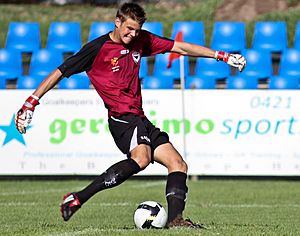
Many popular Australian sports are played in Bundaberg.
Australian Rules Football
Bundaberg has two clubs in the AFL Wide Bay competition:
- Across The Waves Bundaberg Eagles
- Brothers Bulldogs
Basketball
Bundaberg has two professional basketball teams. They are the Bundaberg Autobarn Bulls (men) and Bundaberg Bears (women).
Rowing
Bucca Weir, west of Bundaberg, has an eight-lane rowing course. It hosts the Queensland School's Championship Regatta every year.
Rugby League
The Bundaberg Rugby Football League has nine clubs. Bundaberg also competes in the 47th Battalion Shield.
Soccer
The Bundaberg Soccer Football Association started in 1923. Soccer has been played in the area since the 1890s. Bundaberg was home to the Bundaberg Spirit soccer club.
Tennis
The Bundaberg & District Tennis Senior Association has eleven clay courts. Competition tennis is played all year. The Junior Tennis Association has artificial grass and granite courts.
Croquet
Bundaberg Croquet Club is the oldest Croquet club in Australia.
Community Groups
The Bundaberg branch of the Queensland Country Women's Association meets at the QCWA Hall. The Hinkler branch also meets in Bundaberg Central.
Education in Bundaberg
Bundaberg has many public and private primary schools. Bundaberg South State School opened in 1891.
There are three public high schools: Bundaberg North State High School, Bundaberg State High School, and Kepnock State High School. Bundaberg State High School is one of the oldest high schools in Queensland. There are also three main private high schools: Shalom Catholic College, St Luke's Anglican School, and Bundaberg Christian College.
For higher education, there's a campus of the Wide Bay Institute of Technical and further education. There's also a campus of Central Queensland University near the airport.
Getting Around Bundaberg
Air Travel
Bundaberg Airport has flights to Brisbane and Lady Elliot Island. The Jabiru Aircraft Company, which makes small planes, is also based here.
Bus Services
Duffy's City Buses operates bus services in Bundaberg. They transport many passengers daily. Routes go to beach suburbs like Burnett Heads and Bargara.
Train Services
Bundaberg is served by Queensland Rail passenger trains, including the Tilt Train. It's about four and a half hours north of Brisbane by train.
Roads and Port
Bundaberg is at the end of the Isis Highway. Many long-distance buses also pass through the city.
The Bundaberg Port is 20 km northeast of the city. It's at the mouth of the Burnett River. The port is mainly used for shipping raw sugar and products like Bundaberg Rum.
Military Presence
Bundaberg has two military bases. These are the Bundaberg Army Barracks and Training Ship (TS) Bundaberg.
Sister Cities
Bundaberg has special partnerships with two cities:
| City | Since |
|---|---|
| 12 May 1998 | |
| 9 November 1998 |
Famous People from Bundaberg
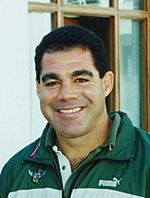
Many notable people have come from Bundaberg, including:
- Mason Barbera, racing driver
- Clint Bolton, soccer player
- Joshua Brillante, soccer player
- Allan Davis, cyclist
- Troy Elder, field hockey player
- Bert Hinkler, pioneer aviator
- Antonio Kaufusi, rugby league footballer
- Felise Kaufusi, rugby league footballer
- Mitchell Langerak, soccer player
- Rosemary Lassig, Olympic swimmer
- Mal Meninga, rugby league footballer and coach
- Gladys Moncrieff, singer
- Vance Palmer, writer
- Don Tallon, Australian cricketer
- Tommy Trash, DJ & Producer
Political Representatives
Current
- Tom Smith, (Labor), State member for Bundaberg
- Keith Pitt (Liberal National Party of Queensland), Federal member for Hinkler
Former
- Prime Ministers Andrew Fisher and Frank Forde both represented areas that included Bundaberg.
Images for kids
See also
 In Spanish: Bundaberg para niños
In Spanish: Bundaberg para niños
 | Jewel Prestage |
 | Ella Baker |
 | Fannie Lou Hamer |


